Older Generations See College As A Pursuit of Passion, While Younger Ones View It As a Path to the Paper
New survey results among Americans who attended or plan to attend college show that younger generations care more about earning potential than pursuing your passion in college.
Key Insights:
- Only 29% of Gen Z's select the ability to pursue their passions as the most important factor in choosing a college, a stark contrast to older generations.
- Significantly more men (46%) prioritize earning potential over passion in college than women (36%).
- Black and Hispanic respondents place more importance on earning potential over passion than White respondents.
Colleges advertise two primary benefits to potential students and their families: that a degree is an investment that will boost graduates’ earning power and that college is a way to pursue a passion that benefits society or leads to a fulfilling life.
We were curious to see how the importance of these benefits has changed over the generations to answer the question: How do each of the generations view the importance of maximizing earning potential vs. pursuing your passion in college?
To shed some light on this question, we surveyed over 2,500 people from across the generations. To gain further insights, we also dug deeper into the subsections of the population including breakdowns by gender and race.
These data will allow us to see how Americans’ preferences and perceptions of college have changed over time, and will hopefully offer colleges some insights into how best to attract, retain, and focus on the outcomes their current students expect out of them.
Younger Generations More Likely to Prioritize Earning Potential in Plans for College
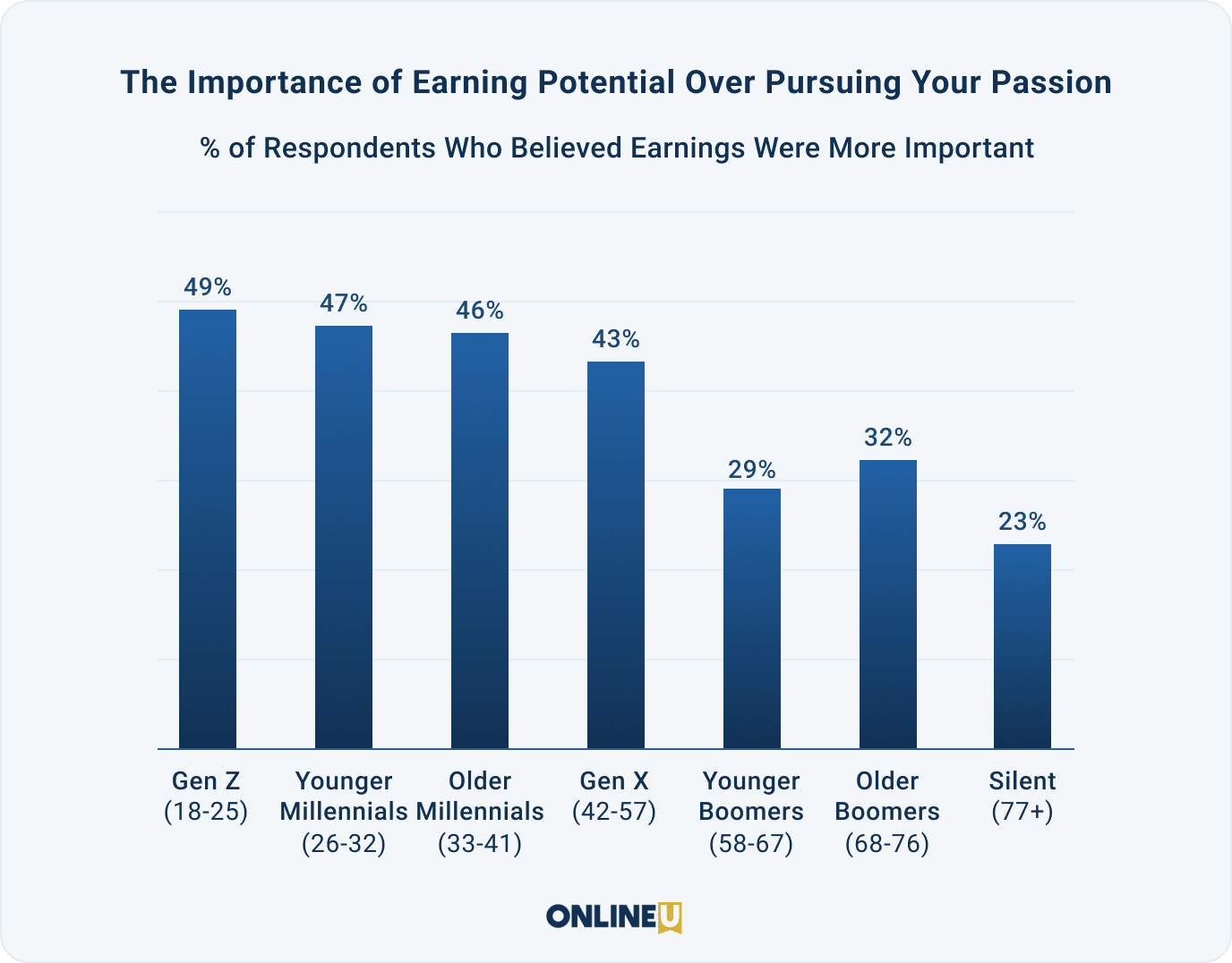
Preference for earning potential over passion is broadly negatively linear, as in, older generations are less likely to agree with the statement, “To live the life I want, strong earning potential is more important than pursuing my passions in college.”
As we can see from the graph, there is a steep dropoff in the relative importance of earnings over passion between Gen X (43%) and Younger Boomers (29%).
If we take the average of those in Gen X and younger, against the average of Younger Boomers and older, we see that 46% of the younger generations chose earnings over passion, while only 30% the older generations did the same.
There are many reasons why younger generations are more likely to prioritize earning potential. First, Baby Boomers grew up in a major post-WWII economic boom, giving a greater sense of security. Boomers came of age in the mid 1950s to mid 1960s, a time when the economy delivered living-wage work for wide swaths of Americans, with or without a degree. Additionally, the average cost of attending a four-year college or university in the United States rose by 497% between the 1985-86 and 2017-18 academic years, more than twice the rate of inflation.
Meanwhile, younger generations have had to deal with the rise in education costs outstripping wage growth. A report by Georgetown researchers using Census, Bureau of Labor and Statistics, and National Center for Education Statistics data showed that between 1980 and 2019, the cost of college has increased by 169% while earnings for workers ages 22 to 27 have only increased by 19%.
This very lopsided growth, coupled with undergraduate degrees being “required” for too many jobs, has led younger generations to question what it is they actually want out of college, and what they are willing to pay or give up for it.
From our data, it appears that younger generations are deciding that, since college will cost them so much money, it is only logical to try to use that degree to maximize their earning potential to make it a worthwhile investment.
It’s also worth noting that these generations have access to more information on college outcomes than their predecessors. If a prospective student knows where to look, they can find the right program at the right school that will likely lead to a job and salary outcome that sounds fair to them.
Older Gens More Likely to See College’s Main Role as a Place to Pursue Passions
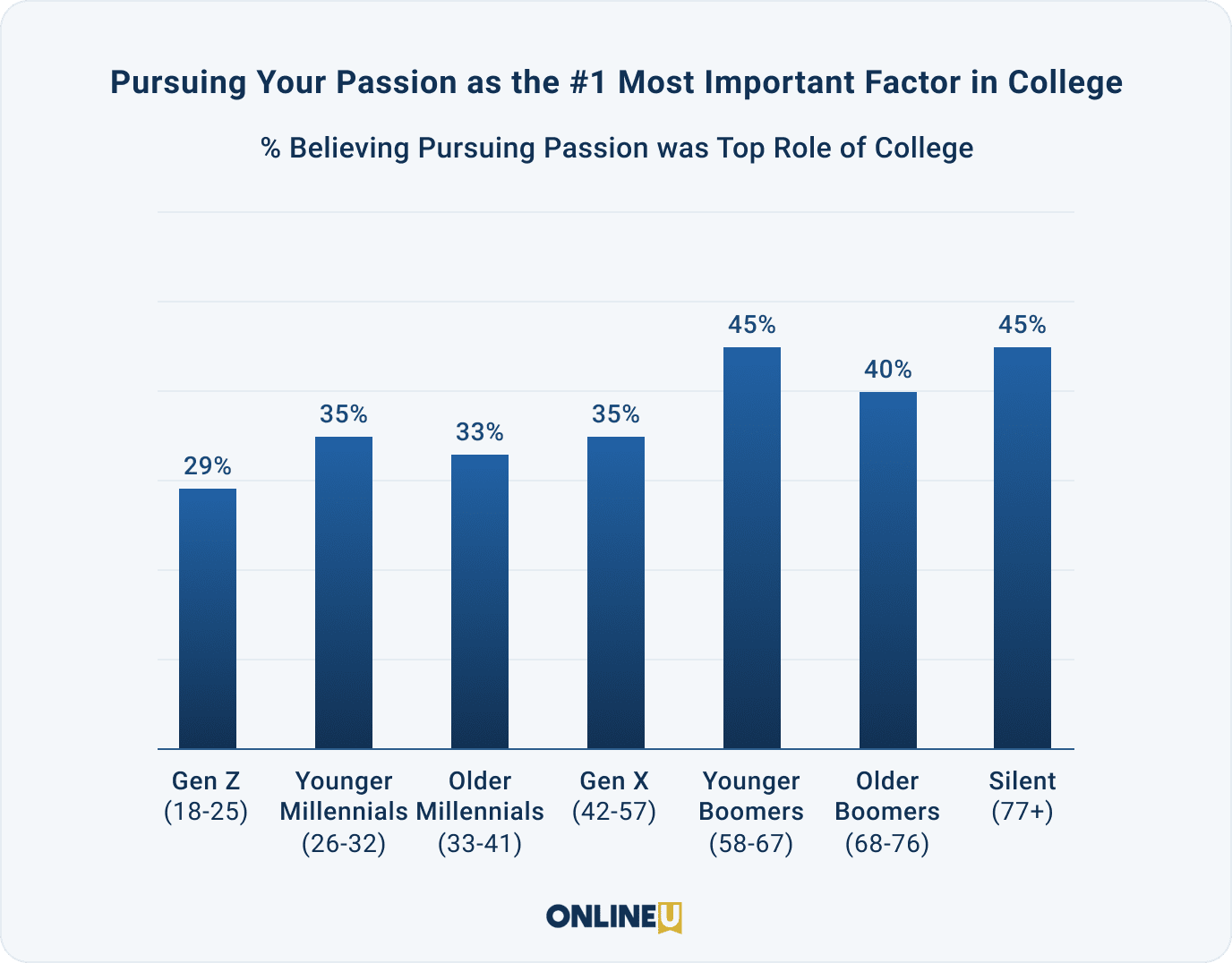
Pursuing a passion as the number one motivator of choosing a college and major is broadly positively linear, so older generations are more likely to cite passion pursuit as the most important aspect of college. Like the earnings question, the cleavage here is again between Gen X and Young Boomers, who are ten percentage points apart in their responses.
Over four in 10 (43%) adults 58 and over – the Baby Boomer generation and beyond – say pursuing a passion was the most important factor in choosing a college. That is ten percentage points greater than Gen Z through Gen X. Only one-third (33%) of these adults aged 18 to 57 said pursuing a passion was most important to them in choosing a college.
Gen Z was about 5 percentage points less likely than their nearest peers, the Millennials, to say that pursuing their passion was the number one factor in choosing a college.
Some of this can likely be attributed to the different economic climate that Gen Z came of age in. The youngest of Gen Z were teenagers during the most significant economic downturn since the Great Depression. Nearly 9 million workers lost their jobs during the Great Recession of 2008-09, some of whom were undoubtedly parents to Gen Z’ers.
Households with high debt loads were particularly vulnerable to economic ruin, giving Gen Z an early lesson in what happens to borrowers in bad times. Even those whose parents didn’t lose jobs or homes likely saw their families’ financial situation change in some form, or knew someone who did. So it makes sense that Gen Z is more concerned with economic security, and see college primarily as a path to a more resilient financial position.
This isn’t to say Gen Z doesn’t care about passion; our questions only asked about pursuing passions in college. It’s likely that the generation sees college mostly as a vehicle for becoming gainfully employed, while passions can be pursued on the side, or potentially deferred.
Women Place Higher Premium on Passions than Men
Overall, men feel it's more important to go into a field of study that leads to high earnings, rather than one that aligns with their passions. Nearly half (46%) of males agree with that statement, whereas only 36% females do, a ten percentage point difference between the genders.
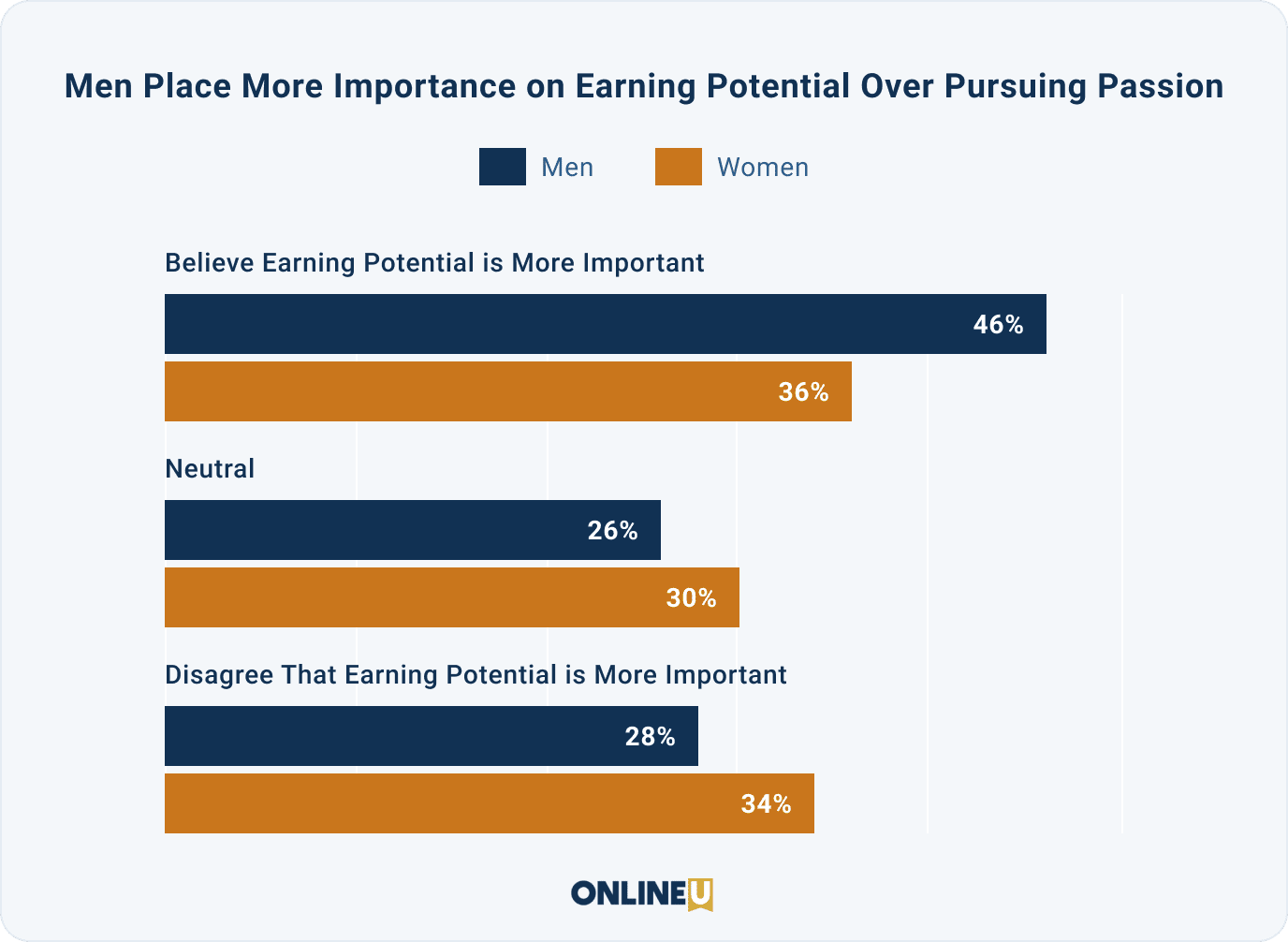
This difference is often seen in choice of major, as men are more likely to agree that in order to live the life they want, it’s more important to go into a field of study with strong earning potential than to pursue a field they are very passionate about. A study from the Economics of Education Review found that women predominately major in fields like social sciences that steer them into lower-paid jobs, while men are more likely to study business or STEM fields that will lead to higher-paying jobs.
“This is one reason why, despite a steady increase in the share of women enrolling in college, the gender wage gap persists. Understanding why women and men graduate with different majors is critical for understanding occupational choices that can influence the gender wage gap,” the Economics of Education Review says.
Our prior research has shown that the median gender pay gap is $11,187 for four-year colleges, with over 20 colleges showing gaps of $30,000 ten years after enrollment. While many instituitional and societal issues factor into these findings, a further avenue of research could be in seeing if females’ desire to pursue passion is a factor of the gender wage gap.
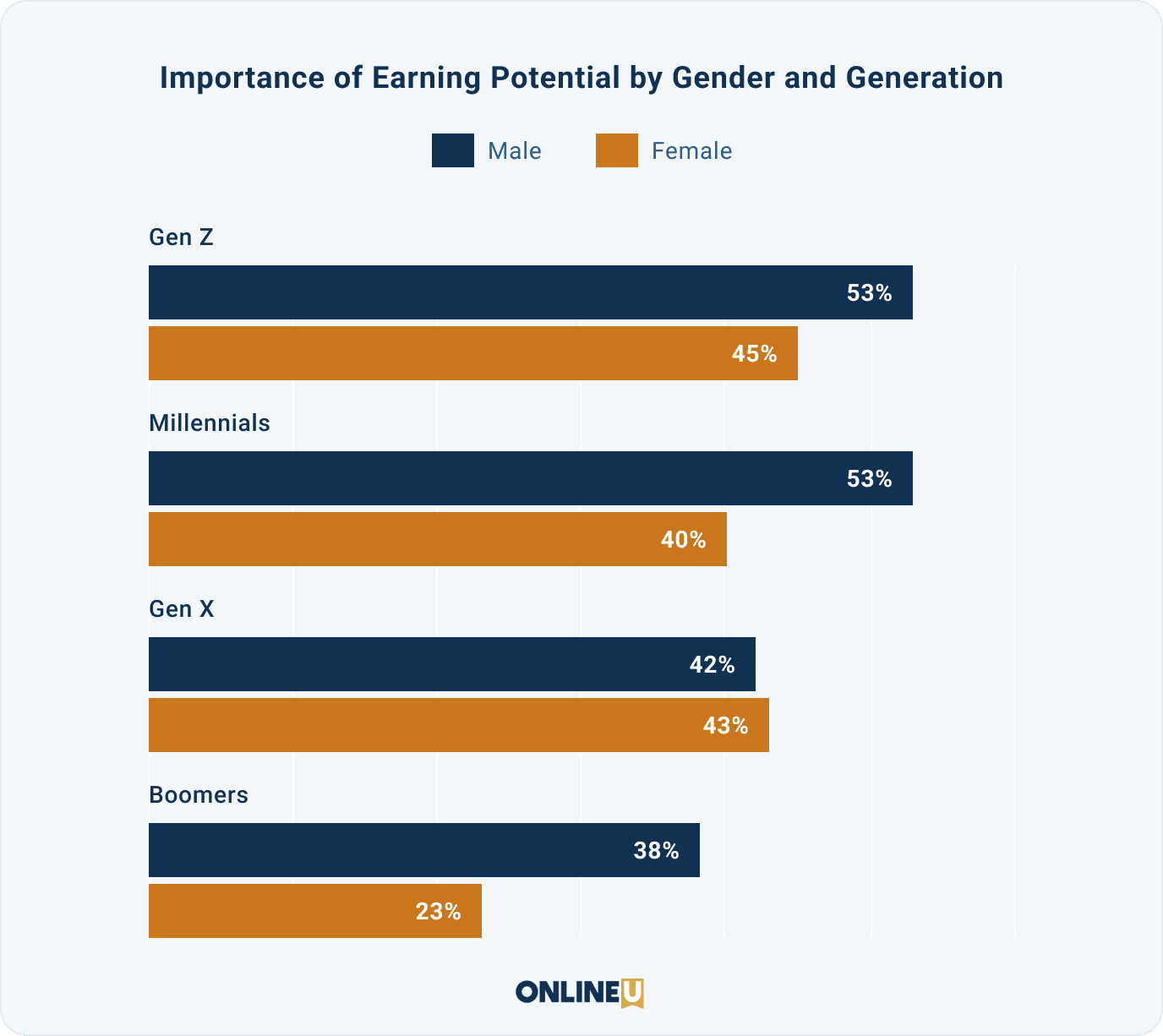
While the above is true in the aggregate of all generations, it is clear that women in younger generations are placing more importance on earning potential. Ultimately, Gen Z had the highest percentage of women saying that earning potential is important, at 45%. This followed the broader pattern of younger generations preferring earning power.
However, the gap between women and men persists in all generations except one. Gen X was the one generation that women and men were on even ground in terms of the importance of earning potential. But what is even more significant is the shift in earning potential importance from Boomers to Gen X. Only 23% of female Boomers agreed that earning potential was more important than passion, while 43% of females of Gen X agreed. That is a difference of 20 percentage points, compared to men’s 4 percentage point spread over the same generations.
This shift in opinion is likely due to the shift in perspective about women's place in the workforce. The oldest women of Gen X would have been entering college and adulthood in the mid-1980s, a period of robust economic growth, and increasing, though insufficient, progress towards making women feel comfortable in the workplace.
The female labor force participation rate reflects this in BLS data. The average female labor force participation rate for Baby Boomers was 48.5%, looking at BLS data from 1968-1986. The same figure for the years 1987-2002, when Gen X would have entered the workforce, was 58.5%, an increase of ten percentage points. Since then, women’s participation in the workforce has remained fairly steady, remaining under 60%. This plateau in labor force participation broadly reflects our data, which shows a certain amount of consensus among generations following Gen X.
Racial Minorities Prioritize Earnings Over Passion, Throughout the Generations
Blacks and Hispanic populations care more about earnings, with Blacks being the most likely to “strongly agree” that it’s more important to go into a field of study with strong earning potential than to pursue a field one is passionate about (26%). Meanwhile, Hispanics are the most likely to agree with this statement in some form (either “agree” or “strongly agree”), with 48% responding that earning potential is more important than pursuing passions.
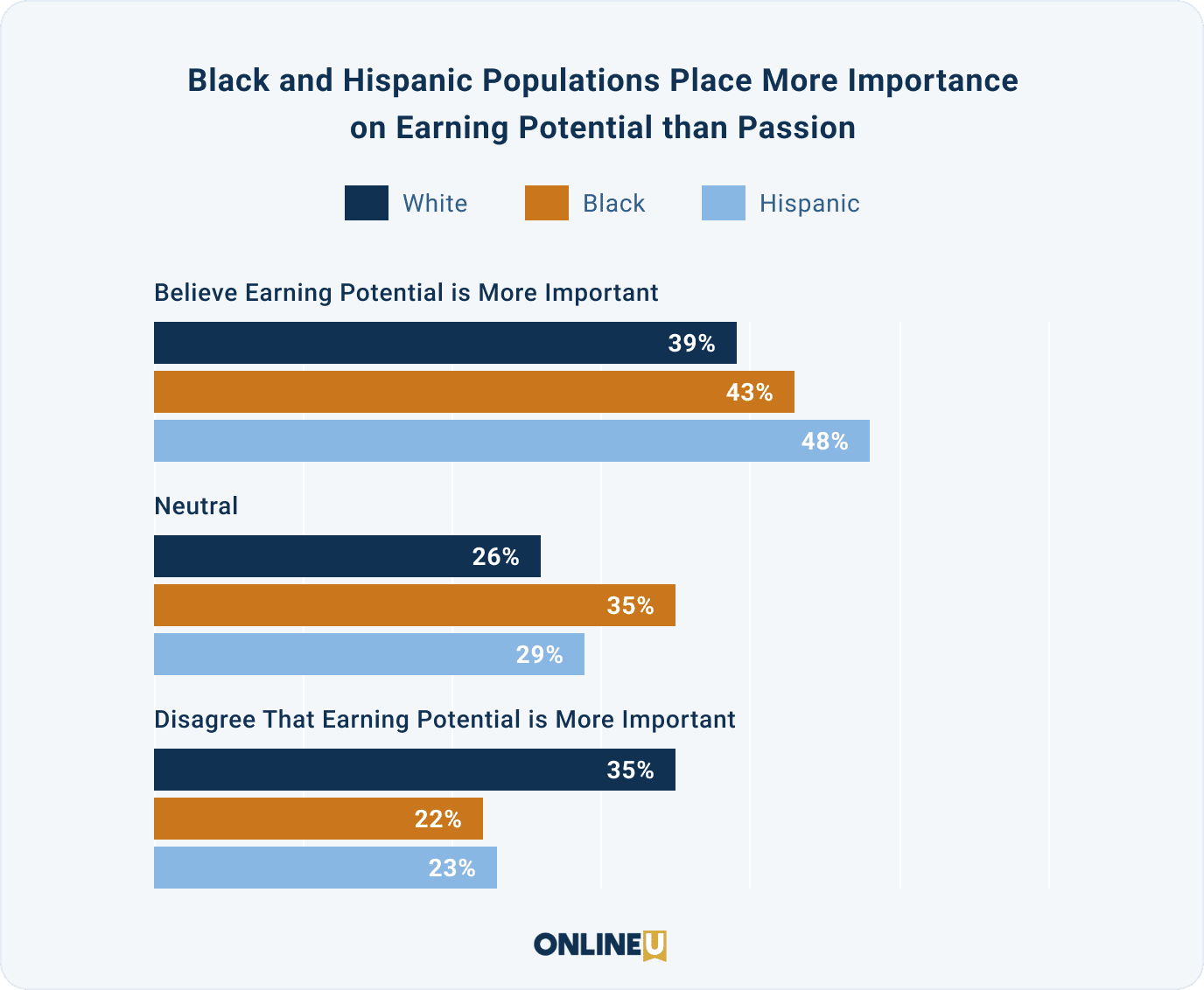
For much of U.S. history, minorities did not have access to higher education. This and other factors blocked their social and economic advancement and caused them to trail Whites along a variety of indicators. We can see this today in the salary gaps between equally qualified workers of different races.
The wealth gap is even more significant, with the typical White family having eight times the wealth of the typical Black family and five times the wealth of the typical Hispanic family, according to the U.S. Federal Reserve.
With those facts front of mind, it is easy to see the logic that has made Black and Hispanic college students to be much less likely to focus on pursuing their passions in school, and so much more likely to focus on maximizing future earnings.
When looking at the generational breakdown, broadly speaking the Black population has never seen college as a place to pursue passion, consistently choosing to focus on earnings over passion across the generations.
Generational Attitudes Towards College Have Changed, and Likely Will Continue To Do So
This new data shows that younger generations are more likely to be interested in the potential earnings boost they expect from college than they are to care about pursuing a particular passion. It also affirms that the opposite is also true: that older generations were more interested in pursuing a passion in college than they are in school’s role as an earnings maximizer.
Just as attitudes have changed over the past hundred years, we should expect them to keep being tweaked by each proceeding generation to better fit their expectations of higher education and their viewpoints on how to work while living a fulfilling life.
Methodology
OnlineU.com commissioned YouGov PLC to conduct the survey. All figures, unless otherwise stated, are from YouGov PLC. The total sample size was 2,573 adults, among whom 1,739 attended or plan to attend college. The figures have been weighted and are representative of all U.S. adults (age 18+). Fieldwork was undertaken in March 10-14th, 2022. The survey was carried out online and meets rigorous quality standards.
